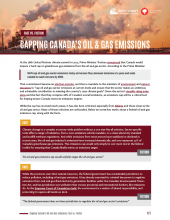
At the 26th United Nations climate summit in 2021, Prime Minister Trudeau announced that Canada would impose a hard cap on greenhouse gas emissions from the oil and gas sector. According to the Prime Minister:
We’ll cap oil and gas sector emissions today and ensure they decrease tomorrow at a pace and scale needed to reach net-zero by 2050.
That commitment became an election promise, and then a mandate to the ministers of environment and natural resources to “cap oil and gas sector emissions at current levels and ensure that the sector makes an ambitious and achievable contribution to meeting the country’s 2030 climate goals.” Given the sector’s steadily-rising emissions and the fact that they comprise 26% of Canada’s overall emissions, an emissions cap will be a critical tool for helping ensure Canada meets its emissions targets.
While the cap has received much praise, it has also been criticized, especially from Alberta and those close to the oil and gas sector. Many of those criticisms are unfounded. In this document, we outline some key myths about a federal oil and gas emissions cap, along with the facts.
* This publication was edited in November 2022 to clarify language about how the carbon tax is applied to large emitters.